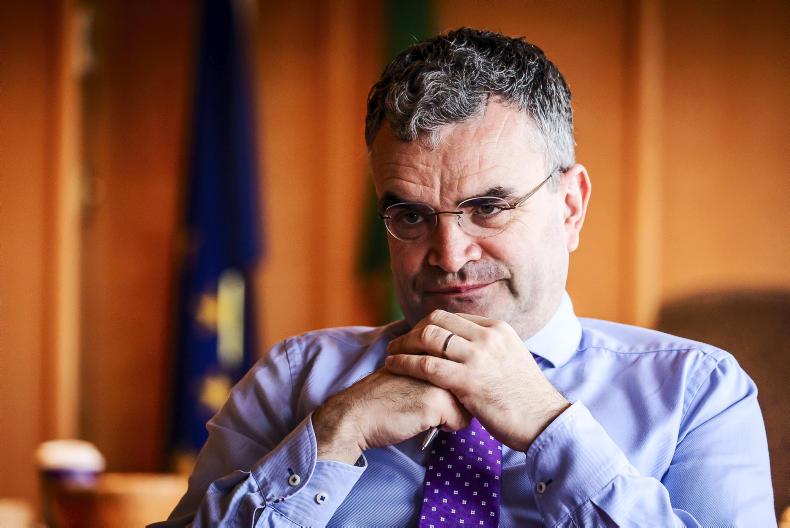Farmers have taken a battering over the past week from the weather and the Government. To tackle the weather first, as we report on
here, gale-force winds and torrential rain have wreaked havoc. Tillage farmers have been hit particularly hard and are struggling with difficult ground conditions, yield losses, quality issues and high moisture content along with the inability to save straw. All are going to have a major impact on the profitability of a sector already dealing with low grain prices.
Farmers have taken a battering over the past week from the weather and the Government. To tackle the weather first, as we report on here, gale-force winds and torrential rain have wreaked havoc.
Tillage farmers have been hit particularly hard and are struggling with difficult ground conditions, yield losses, quality issues and high moisture content along with the inability to save straw. All are going to have a major impact on the profitability of a sector already dealing with low grain prices.
The same difficult ground conditions have seen farmers in other sectors across the country forced to rehouse stock with animal performance and milk yields falling as costs rise.
Throughout this week’s paper, our specialists look at what steps can be taken to limit the impact of what will hopefully be a temporary deterioration in weather conditions.
One storm to another
Unfortunately for farmers, the consequences of the political storm that engulfed the country following a golf event in Galway last week are unlikely to be temporary. Dara Calleary’s resignation as minister for agriculture just 37 days after his appointment and – following the sacking of Barry Cowen from the position after just 17 days in the job – is a devastating blow. It is a point that has been totally missed in the national discussion.

Barry Cowen was minister for agriculture for 17 days. \ Philip Doyle
It effectively means that farmers have had no strategic political leadership since the start of the year. Early in the year, political attention was focused on the general election with Michael Creed fulfilling a caretaker role during the four months of Government formation talks that followed.
Against this backdrop, it was incredulous that the Taoiseach’s initial response to Dara Calleary’s resignation was to delay the appointment of a new minister until the Dáil resumed in mid-September. Only in the face of political pressure from opposition parties did the Government agree to recall the Dáil early.
Of course, caretaker ministers were the norm across the entire range of Government portfolios during formation talks. But we must recognise that agriculture is different. Decisions at EU level in relation to trade and agriculture policy often have greater influence on our agriculture sector than the direction of national policy.
One of the key functions of the minister for agriculture is to ensure the interests of Irish farmers are kept centre-stage when decisions are being made in Brussels. This is achieved through strong political representation at EU agriculture council meetings and the development of key strategic alliances with agriculture ministers across other member states.
Ireland’s ability to deliver on both fronts has been hugely damaged. The merry-go-round of agriculture ministers has seen three different ministers representing the interests of Irish farmers at EU council meetings since June. Worryingly, it comes as negotiations on the future of the CAP intensify under the German presidency.

Dara Calleary resigned from his position as minister for agriculture after attending a golfing event in Clifden. \ Philip Doyle
A two-day informal meeting of EU agriculture ministers is scheduled for the start of next week. With the ambition of reaching a critical CAP deal as early as October, German minister for agriculture Julia Klöckner has tabled discussions on labelling and welfare elements of CAP, as well as Farm to Fork frameworks that will begin to shape EU and Irish agriculture for the next decade. Phelim O’Neill goes into detail here.
It is unclear as to what political representation Irish farmers will have at this meeting. It would not be credible for the Government to leave the Irish seat empty. On the other hand, sending a junior minister would lead to an unprecedented scenario where a new minister for agriculture would find themselves attending a crunch CAP meeting in October as the fifth political representative from Ireland in as many months.

\ Jim Cogan
Either scenario would be hugely damaging to Ireland’s political standing within the EU and weaken our voice in CAP negotiations. To avoid this, the Taoiseach must nominate a new minister for agriculture before the weekend. The nomination could be approved when the Dáil sits next Wednesday. This would allow whoever is selected to attend next week’s informal EU council meeting as the Government’s nominee and allow them to start the process of building up key strategic alliances. It would also provide an increased opportunity for them to begin to read into what is a highly complex brief.
Hogan’s wrongdoings
No one should even attempt to defend Phil Hogan’s actions in relation to his attendance at a golfing event in Galway last week – or the way in which he has responded to the public anger. But the debate should have gone wider than focusing on the individual. It remains to be seen what impact his departure will have on Ireland’s influence within the college of commissioners just 126 days from what looks almost certain to be a no-deal Brexit.

European Commissioner for Trade Phil Hogan.
With Hogan’s departure, one of the first measures of the impact on Ireland will be who succeeds him. It would be unbelievable to think that in the midst of Brexit negotiations, the Government, prior to moving to undermine Hogan, would not have secured political assurances from other EU leaders, particularly in France and Germany, that Ireland would retain the trade portfolio. Should Ireland lose the portfolio, the Government cannot be allowed to ignore the political damage.
On securing the position of Commissioner for Trade, then Taoiseach Leo Varadkar said: “Commissioner Hogan will of course work for Europe but it is a definite advantage to have an Irish person in charge of this crucial brief over the next five years.”
If Phil Hogan’s position is not retained by an Irish commissioner, then the Government must take full responsibility for ensuring that the EU response to Brexit protects the Irish economy and the income of farmers.
Collateral damage
We should not lose sight of the fact that the Government’s own assessment of the financial hit to agriculture of a no-deal Brexit will be in the region of €1.7bn per annum. It is extremely worrying that the Government, in its response to the political fallout from the golfing event, appeared content to allow farmers and the agriculture sector be the collateral damage in its battle for survival. While it should be acknowledged that this was not a political storm created by the Government, their response to it has further damaged their credibility.
Rebuilding should start with the immediate nomination of a new Minister for Agriculture who can attend next week’s EU council meeting. It must then be followed by Government coming forward with a detailed plan as to how they will ensure Ireland’s political influence in Brussels and around CAP and Brexit will be maintained. Unless the Government can deliver this, they will stand accused of putting their own survival ahead of the national interest.





SHARING OPTIONS: